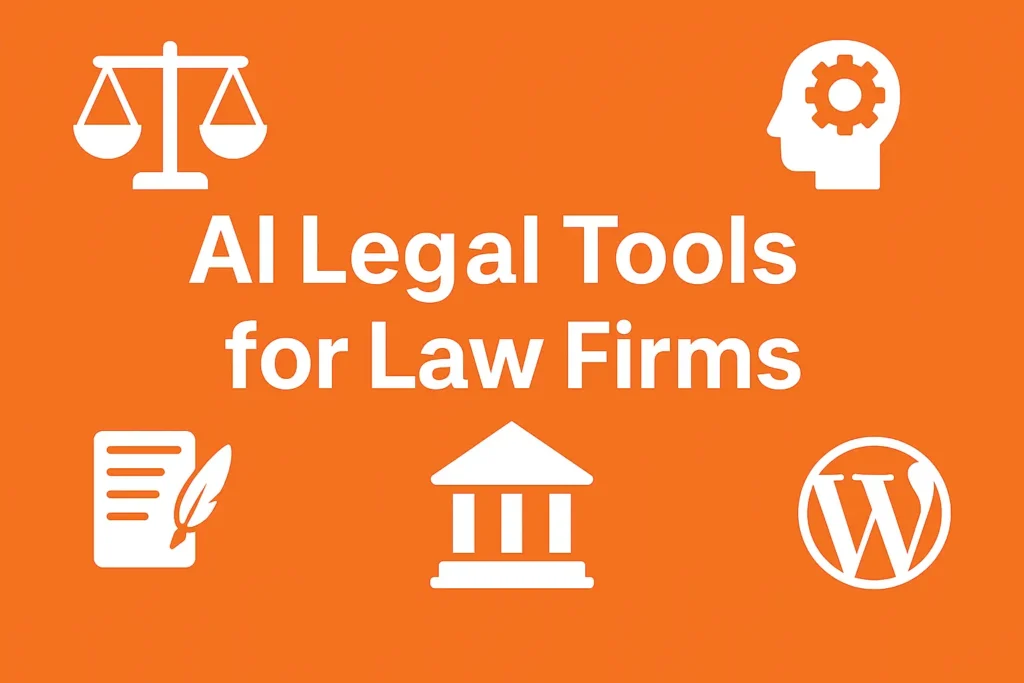The legal industry is undergoing a seismic shift, with artificial intelligence at its epicenter. In 2025, law firms that integrate AI tools into their practice aren’t just staying current that they’re gaining a decisive competitive edge. AI is revolutionizing legal workflows, leading to dramatic improvements in efficiency, accuracy, and client outcomes.
Whether you’re managing a solo practice or a global firm, AI legal software can help you automate tedious tasks, reduce operational costs, and deliver higher-value legal services.
This guide explores the top 10 AI legal tools of 2025, breaking down their features, core benefits, and ideal use cases to help you select the right solution for your firm.
Quick Comparison: Top AI Legal Tools by Category
| Tool | Category | Best For | Key Feature |
| Thomson Reuters CoCounsel | Legal Research & Drafting | All-around legal assistance | GPT-4 powered task automation |
| Lexis+ AI | Legal Research & Analysis | In-depth case law research | Conversational search & summarization |
| Harvey AI | Generative AI Drafting | Elite firms needing custom solutions | Advanced legal reasoning & drafting |
| Litera (Kira) | Contract Analysis | M&A due diligence | High-speed clause extraction |
| Luminance | Contract Analysis | Corporate & in-house teams | AI-powered risk detection |
| LegalMation | Litigation Automation | Litigation-heavy firms | Automated pleading & discovery drafts |
| Smokeball | Practice Management | Small to mid-sized firms | Automatic time & activity tracking |
Why AI Legal Tools are Essential for Modern Law Firms
AI tools in the legal sector are no longer a novelty; they are practical solutions to the daily challenges legal professionals face. According to a 2024 report by Deloitte, over 50% of legal departments are planning to increase their investment in legal technology, with a strong focus on AI.
Here are the core benefits of adopting AI in your practice:
- Reclaim Billable Hours: Automate time-consuming tasks like document review, legal research, and contract analysis to free up lawyers for strategic, high-value work.
- Enhance Accuracy and Reduce Risk: AI algorithms can analyze thousands of documents with a consistency that minimizes the risk of human error in due diligence and discovery.
- Boost Productivity: Get faster answers, draft documents in minutes instead of hours, and manage caseloads more effectively, leading to improved client satisfaction.
- Optimize Operational Costs: By automating routine work, firms can better allocate resources, reduce overhead, and offer more competitive pricing.
Understanding the Types of AI in Legal Tech
Before diving into the tools, it’s helpful to know the two main types of AI you’ll encounter:
- Analytical AI: This type of AI is trained to analyze vast datasets to identify patterns, classify information, and find relevant documents. Tools for eDiscovery and contract analysis (like Kira) are prime examples.
- Generative AI: This is the technology behind tools like ChatGPT. In a legal context, generative AI creates new content, such as drafting legal memos, summarizing case law, or composing client emails. CoCounsel and Harvey are leading examples.
AI Tools for Legal Research & Drafting
These tools use AI to supercharge the foundational tasks of legal research, analysis, and document creation.
1. Thomson Reuters CoCounsel (formerly Casetext)
Powered by GPT-4, CoCounsel is a versatile AI legal assistant that can handle an impressive range of tasks with speed and precision. After its acquisition by Thomson Reuters, it has been integrated with trusted content from Westlaw and Practical Law.

Key Features:
- Drafting: Creates legal memos, discovery requests, and even entire briefs based on your instructions.
- Contract Analysis: Reviews and analyzes contracts, identifying key clauses and potential risks in minutes.
- Legal Research: Provides reliable, source-backed answers to complex legal questions, complete with citations.
Our Expert Take: CoCounsel is arguably the most well-rounded generative AI tool for lawyers on the market. Its ability to perform a wide variety of tasks from research to drafting makes it an incredibly powerful “co-pilot” for lawyers in almost any practice area.
- Best For: Law firms of all sizes seeking a powerful, all-in-one AI assistant to accelerate research and drafting.
- Pricing: Available upon request; requires a demo.
2. Lexis+ AI
Lexis+ AI leverages LexisNexis’s extensive repository of case law, statutes, and legal documents. It offers a conversational search interface that allows lawyers to ask complex questions in natural language and receive summarized, cited answers.

Key Features:
- Conversational Search: Ask questions like “What is the standard for summary judgment in the Ninth Circuit?” and get a direct answer.
- AI-Powered Summarization: Provides concise summaries of cases, saving hours of reading time.
- Generative Drafting: Can draft clauses, arguments, and client communications based on search results.
Our Expert Take: While CoCounsel excels at task execution, Lexis+ AI shines in its deep integration with a trusted legal research database. For firms that live and breathe in the LexisNexis ecosystem, this tool is a natural and powerful extension of their existing workflow.
- Best For: Firms that rely heavily on the LexisNexis database for in-depth legal research and analysis.
- Pricing: Available upon request; typically bundled with a LexisNexis subscription.
3. Harvey AI
Harvey is a generative AI platform built on OpenAI’s technology and trained specifically for complex legal work. It gained prominence through its partnership with elite law firms like Allen & Overy, positioning itself as a premium tool for sophisticated legal reasoning.

Key Features:
- Advanced Legal Analysis: Performs deep analysis of legal frameworks and complex scenarios.
- Specialized Drafting: Can draft intricate legal arguments, contract clauses, and compliance documents.
- Customizable Workflows: Can be tailored to a firm’s specific practice areas and knowledge base.
Our Expert Take: Harvey is the top-tier, enterprise-grade solution for Big Law. It’s less of an off-the-shelf product and more of a customizable platform for firms willing to invest heavily in integrating AI at the highest level.
- Best For: Large, international law firms and in-house legal departments handling complex, high-stakes work.
- Pricing: Custom enterprise pricing; not publicly available.
AI Tools for Contract Analysis & Due Diligence
These platforms use AI to automate the painstaking process of reviewing and extracting information from contracts and other legal documents.
4. Litera (Kira Systems)
Acquired by Litera, Kira is a market leader in AI-powered contract analysis. It uses machine learning to quickly identify and extract key clauses and data points from large volumes of contracts, making it indispensable for M&A due diligence.
Key Features:
- Smart Field Extraction: Automatically pulls key information like renewal dates, liability caps, and change-of-control clauses.
- Pre-Built Provision Models: Comes with hundreds of built-in models to find common clauses.
- Customizable AI: Users can train Kira to recognize unique or firm-specific clauses.
Our Expert Take: Kira is the workhorse for transactional practices. Its speed and accuracy in due diligence are unmatched. While generative AI tools are adding contract analysis features, Kira’s specialized, pre-trained models still give it an edge in high-volume, complex reviews.
- Best For: Corporate law firms and legal teams handling M&A, real estate, and other transactional work.
- Pricing: Available upon request.
5. Luminance
Luminance is an AI platform designed for the entire lifecycle of a contract, from negotiation to review. It uses a unique blend of supervised and unsupervised machine learning to surface risks, anomalies, and key information without extensive setup.
Key Features:
- AI-Powered Risk Detection: Automatically flags non-standard clauses or potential compliance issues.
- Smart Clause Comparison: Lines up similar clauses across multiple documents for easy comparison.
- Conceptual Search: Can search for concepts (e.g., “indemnity”) rather than just keywords.
Our Expert Take: Luminance’s strength is its ability to be deployed quickly and provide value “out of the box.” It’s an excellent tool for in-house teams that need to get a handle on their entire contract repository and for firms needing a fast solution for due diligence.
- Best For: In-house legal departments and corporate firms needing rapid insights into large document sets.
- Pricing: Subscription-based; available upon request.
AI Tools for Litigation & Practice Management
This category includes tools that automate specific litigation tasks and embed AI into the daily operations of a law firm.
6. LegalMation
LegalMation focuses on automating the early stages of litigation. It can analyze a legal complaint and generate initial drafts of discovery requests, answers, and other responsive pleadings in a matter of minutes.
Key Features:
- Automated Document Generation: Drafts responses to complaints, discovery requests, and subpoenas.
- Consistent & Formatted Output: Ensures documents adhere to firm standards and jurisdictional rules.
- Integration: Works with common case management systems.
Our Expert Take: LegalMation is a highly specialized tool that does one thing incredibly well: it crushes the boilerplate work of litigation. For firms with high-volume litigation practices, the time savings can be enormous, allowing lawyers to focus on strategy from day one.
- Best For: Insurance defense firms and litigation boutiques with heavy caseloads.
- Pricing: Available upon request.
7. Smokeball
Smokeball is a comprehensive cloud-based legal practice management software that integrates AI to streamline firm operations. Its standout AI feature is AutoTime, which automatically tracks a lawyer’s activity and creates precise time entries.
Key Features:
- Automatic Time Tracking (AutoTime): Captures every minute spent on a matter from drafting a document to reading an email without manual timers.
- AI-Powered Document Assembly: Automates the creation of legal documents using firm-specific templates.
- Centralized Case Management: Combines documents, tasks, and communications for each matter.
Our Expert Take: While not a pure-play generative AI tool, Smokeball’s practical application of AI to solve the universal headache of timekeeping is a game-changer for small and mid-sized firms. It directly boosts profitability by ensuring no billable work is missed.
- Best For: Small to mid-sized law firms looking to improve profitability and operational efficiency.
- Pricing: Subscription-based; available upon request.
Other Notable AI Legal Tools
8. vLex (Vincent AI)
After ROSS Intelligence ceased operations, vLex’s Vincent AI has emerged as a top-tier replacement and competitor. It is an intelligent legal research assistant that can analyze a legal document (like a brief or motion) and find related, on-point case law.
- Best For: Fast, comprehensive research support and finding authoritative cases.
- Source: vlex.com/vincent-ai
9. LawGeex
This tool excels at automating the review of inbound contracts against a company’s pre-approved legal policies or “playbooks.”
- Best For: In-house legal teams managing a high volume of standard contracts like NDAs and MSAs.
- Source: lawgeex.com
10. DoNotPay
Marketed as the “world’s first robot lawyer,” DoNotPay is a consumer-focused app that uses AI to help individuals with tasks like fighting parking tickets, appealing bank fees, and navigating small claims court.
- Best For: Individuals and very small businesses managing simple, consumer-level legal issues.
- Source: donotpay.com
How to Choose the Right AI Legal Tool for Your Firm
Selecting the right tool requires a strategic approach. Follow these steps:
- Identify Your Biggest Pain Point: Where do you lose the most time? Is it in legal research, contract review, or drafting routine documents? Start by solving your most significant problem first.
- Evaluate Data Security: This is non-negotiable. Ensure the tool is compliant with data privacy regulations (like GDPR) and offers robust security protocols to protect confidential client information. Ask vendors about their data handling and encryption policies.
- Prioritize Integration: The best tools fit seamlessly into your existing workflow. Check for integrations with your document management system, practice management software (e.g., Clio, MyCase), and Microsoft Office 365.
- Start with a Pilot Program: Don’t roll out a new tool firm-wide overnight. Select a small team or a specific practice group to run a pilot test. Gather feedback on usability, accuracy, and its real-world impact on their work.
- Consider the ROI: Look beyond the subscription cost. Calculate the potential return on investment in terms of hours saved, increased accuracy (and reduced write-offs), and faster turnaround times for clients.
Final Thoughts: The AI-Powered Law Firm is Here
AI legal tools are no longer an optional luxury that they are a core component of the modern, efficient, and client-centric law firm. By automating repetitive work, these tools empower lawyers to focus on what they do best: providing strategic counsel and delivering exceptional results.
Start by identifying your firm’s most pressing needs and explore the tools that address those pain points. The transition to an AI-powered practice is a journey, but the firms that start today will be the ones that lead the legal industry tomorrow.








